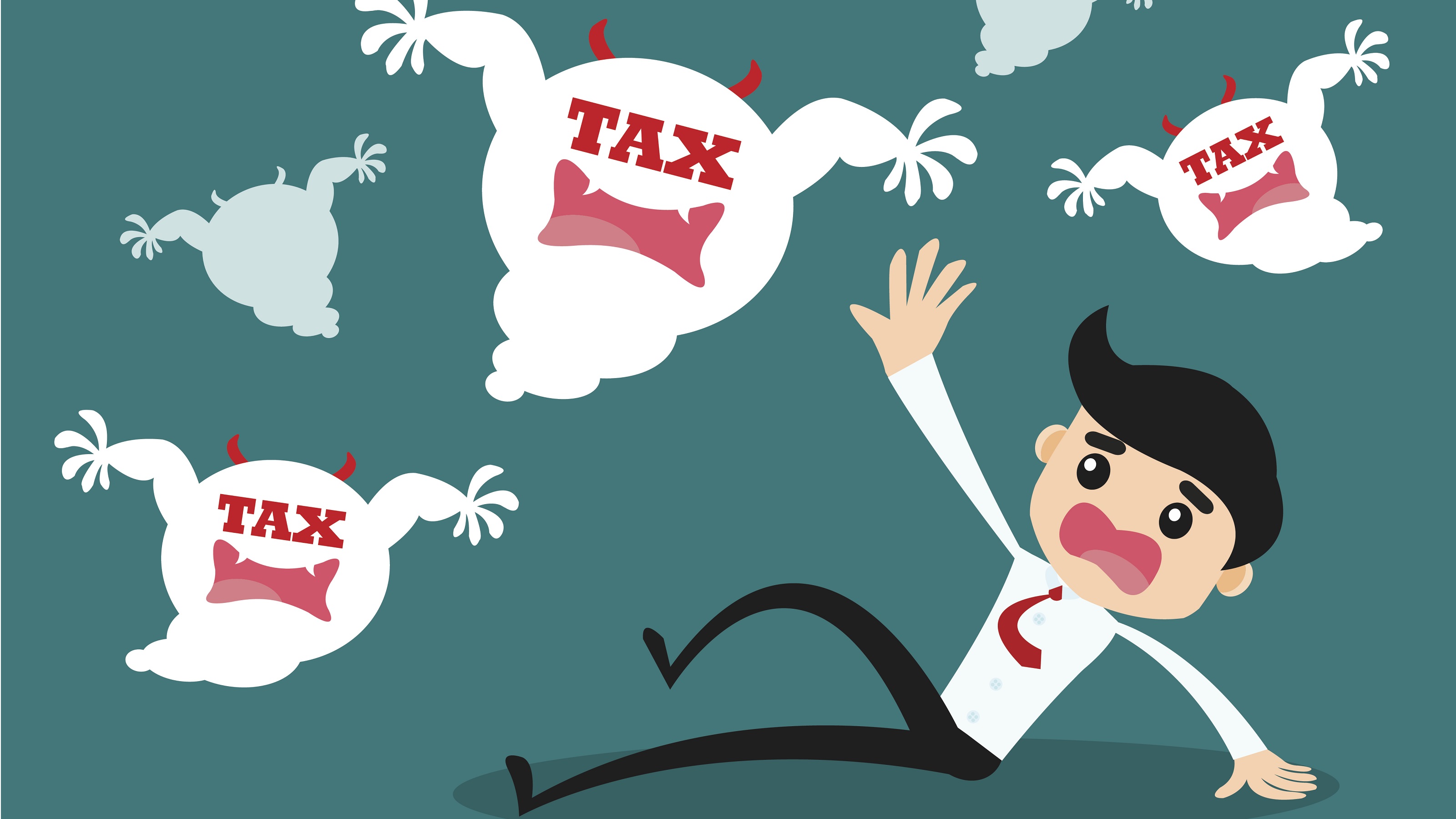Is a Silent Wealth Killer Stalking Your Retirement?
Poor tax planning can drain your retirement of tens or even hundreds of thousands. Stop the bleeding with a laser focus on tax efficiency.


Profit and prosper with the best of Kiplinger's advice on investing, taxes, retirement, personal finance and much more. Delivered daily. Enter your email in the box and click Sign Me Up.
You are now subscribed
Your newsletter sign-up was successful
Want to add more newsletters?

Delivered daily
Kiplinger Today
Profit and prosper with the best of Kiplinger's advice on investing, taxes, retirement, personal finance and much more delivered daily. Smart money moves start here.

Sent five days a week
Kiplinger A Step Ahead
Get practical help to make better financial decisions in your everyday life, from spending to savings on top deals.

Delivered daily
Kiplinger Closing Bell
Get today's biggest financial and investing headlines delivered to your inbox every day the U.S. stock market is open.

Sent twice a week
Kiplinger Adviser Intel
Financial pros across the country share best practices and fresh tactics to preserve and grow your wealth.

Delivered weekly
Kiplinger Tax Tips
Trim your federal and state tax bills with practical tax-planning and tax-cutting strategies.

Sent twice a week
Kiplinger Retirement Tips
Your twice-a-week guide to planning and enjoying a financially secure and richly rewarding retirement

Sent bimonthly.
Kiplinger Adviser Angle
Insights for advisers, wealth managers and other financial professionals.

Sent twice a week
Kiplinger Investing Weekly
Your twice-a-week roundup of promising stocks, funds, companies and industries you should consider, ones you should avoid, and why.

Sent weekly for six weeks
Kiplinger Invest for Retirement
Your step-by-step six-part series on how to invest for retirement, from devising a successful strategy to exactly which investments to choose.
Retirement is an exciting new chapter, a time to enjoy the fruits of your hard work and sacrifice. But here's something many financial advisers and retirees overlook: Tax planning doesn't stop when you stop working.
Making the right tax decisions can significantly boost your retirement lifestyle, while also benefiting your spouse, children and other heirs.
This article is written by CFP Connor Zimmer, an investment adviser representative at Rooted Wealth Advisors, Inc. Connor’s background in comprehensive financial planning and investment management helps him harness his passion to help clients envision and create a road map to achieve their goals.
From just $107.88 $24.99 for Kiplinger Personal Finance
Become a smarter, better informed investor. Subscribe from just $107.88 $24.99, plus get up to 4 Special Issues

Sign up for Kiplinger’s Free Newsletters
Profit and prosper with the best of expert advice on investing, taxes, retirement, personal finance and more - straight to your e-mail.
Profit and prosper with the best of expert advice - straight to your e-mail.
In this article, we'll show you how to create a tax-efficient strategy that maximizes your retirement and legacy.
Understanding the tax landscape in retirement
If you’re like many of our clients who are just retiring, you’re looking forward to sipping coffee on your patio on Monday morning, taking that trip you’ve always dreamed of or spending more time with friends and loved ones. The hard part of the journey is over, and now you get to really enjoy life.
You might think that the time for financial planning is over. But wait: There’s a bigger opportunity now, more than ever, to implement tax planning. While you can kick your feet up in retirement, make sure present-day you are watching out for future you.
One of the many changes as you begin your retirement journey is where you get the income to pay your bills. Gone are the days of regular paychecks, replaced by Social Security, pension benefits and withdrawals from retirement accounts. But each of the following income sources is subject to different tax rules that can affect your overall financial health:
1. Maximizing Social Security benefits
Did you know up to 85% of your Social Security benefits can be taxed? If your combined income exceeds a certain threshold, you could be paying more in taxes than necessary.
Timing your retirement withdrawals and managing your income sources strategically can minimize the tax burden on your Social Security benefits.
2. Tax-efficient withdrawal strategies
Traditional IRAs and 401(k)s may offer tax-deferred growth, but withdrawals from these accounts are taxed as ordinary income.
On the other hand, Roth IRAs provide tax-free withdrawals. By converting some of your traditional savings into Roth accounts, you can reduce future tax liabilities and enjoy tax-free growth.
3. Managing investment income
Investments in taxable accounts can generate dividends and capital gains, both of which are taxable. A well-planned, tax-efficient investment strategy can help you minimize the impact of these taxes on your retirement.
4. Estate planning and inheritance
Tax-efficient strategies don’t just help you — they also protect your legacy. By planning ahead, you can minimize estate and inheritance taxes, ensuring your heirs inherit as much as possible.
It can be difficult to assess the true value of a cohesive tax plan. That’s why we suggest going through advanced tax planning to learn the true cost savings of something like a strategic Roth conversion.
If you can see the value and the math makes sense, you may realize you have been leaving thousands (or even tens of thousands) of dollars on the table by not taking advantage of it.
I once spoke to a couple (who are now clients) who had saved millions in assets yet had a low taxable income. Their goal? To save as much as they could to leave their kids better off than they were.
Looking for expert tips to grow and preserve your wealth? Sign up for Building Wealth, our free, twice-weekly newsletter.
My clients didn’t consider, however, that with their children’s high-paying jobs and the non-spousal IRA inheritance rules, their kids would be taxed over 40% on the money they left to them! Meaning the true value of their inheritance was just over half of what they thought it would be.
With some meaningful tax strategy, we were able to cut the projected taxes by over half. That is the power of advanced tax planning.
Where many financial advisers have too narrow of a focus
How does the average investor gauge their adviser’s success? If you said “rate of return,” you’re right! We all want as high of a return as possible, right? Of course we do. But what else should your adviser be doing?
The reality is that most advisers talk about one thing only: investment returns. If it was a good year, they’re probably happy to show you their success. In a year of high market volatility, perhaps not so much.
But shouldn’t an adviser be doing so much more? After all, they are financial advisers, not just investment advisers. Or, at least, they should be!
A truly independent, fiduciary adviser should be talking with you about not only investments, but taxes, income strategy, health care and estate planning. Most don’t, either because they lack the expertise or are missing the credentials to do so.
Do you know why many advisers don’t discuss Roth conversions? It’s because after taxes are paid, the assets under their management decrease, meaning they receive lower fees. That is certainly a conflict of interest.
Is your adviser doing everything they can, or are they simply acting as an asset manager?
So, what are some of the strategies your adviser could suggest for better tax efficiency in retirement? Here are a few:
1. Diversify your retirement accounts
Build a mix of taxable, tax-deferred and tax-free retirement accounts to give yourself more flexibility in retirement. This diversification allows you to pull from various sources, lowering your overall tax burden.
2. Implement Roth conversions
Taxes are at historically low rates right now, but that won’t last forever. Starting in 2026, tax rates are set to increase to their previous levels.
Converting some of your traditional savings into Roth IRAs today could save you thousands in the long run.
3. Plan for required minimum distributions (RMDs)
At age 73 (or age 75 if you were born in 1960 or later), the IRS requires you to take minimum distributions from traditional IRAs and 401(k)s. Without careful planning, these withdrawals could push you into a higher tax bracket.
A well-thought-out RMD strategy can help reduce this impact.
4. Tax-loss harvesting
Offset capital gains with capital losses to reduce your overall tax bill. By reviewing and rebalancing your portfolio regularly, you can take advantage of tax-loss harvesting to minimize taxes on investment gains.
5. Consult a tax professional
Tax laws are complex and change often. Working with a tax adviser or financial planner can help you navigate these rules effectively and ensure your strategy is up-to-date and optimized for your unique situation.
Whether we like it or not, taxes have a huge impact on our lives. That doesn’t end once you stop working.
One of the most common things I hear once we begin the tax planning process with our clients is, “I wish we had been doing this for years.” Don’t let tax planning opportunities pass you by and live with the regret of the taxes you could have saved.
By having a cohesive tax strategy, you could be saving yourself tens if not hundreds of thousands of dollars over your lifetime. It can even save your beneficiaries money as well, meaning they get more of your hard-earned legacy.
Whether you’re in retirement already or just a few years away, don’t make the mistake of celebrating before you hit the finish line. It’s a good idea to utilize a tax professional and financial adviser to ensure you are making the most of your money.
After all, it’s not just about how much you’ve saved — it’s about how much you keep.
The appearances in Kiplinger were obtained through a PR program. The columnist received assistance from a public relations firm in preparing this piece for submission to Kiplinger.com. Kiplinger was not compensated in any way.
Related Content
- How to Convert a Traditional IRA to a Roth After 60
- Protect Your Retirement: Seven RMD Mistakes to Avoid
- How Tax Diversification Can Increase Your Retirement Income
- Reduce Your Retirement Tax Risk With the Three-Bucket Strategy
- What Is a Good Inheritance? Six Great Assets to Inherit
Profit and prosper with the best of Kiplinger's advice on investing, taxes, retirement, personal finance and much more. Delivered daily. Enter your email in the box and click Sign Me Up.

Connor Zimmer provides investment advisory services through Rooted Wealth Advisors, Inc. Connor has been passionate about personal finance and financial planning since his college days. Over the years, he has garnered experience at different firms before ultimately landing at Rooted Wealth Advisors. Connor’s background is in comprehensive financial planning and investment management, and he harnesses his passion to help clients envision and create a road map to achieve their goals.
-
 The New Reality for Entertainment
The New Reality for EntertainmentThe Kiplinger Letter The entertainment industry is shifting as movie and TV companies face fierce competition, fight for attention and cope with artificial intelligence.
-
 Stocks Sink With Alphabet, Bitcoin: Stock Market Today
Stocks Sink With Alphabet, Bitcoin: Stock Market TodayA dismal round of jobs data did little to lift sentiment on Thursday.
-
 Betting on Super Bowl 2026? New IRS Tax Changes Could Cost You
Betting on Super Bowl 2026? New IRS Tax Changes Could Cost YouTaxable Income When Super Bowl LX hype fades, some fans may be surprised to learn that sports betting tax rules have shifted.
-
 Stocks Sink With Alphabet, Bitcoin: Stock Market Today
Stocks Sink With Alphabet, Bitcoin: Stock Market TodayA dismal round of jobs data did little to lift sentiment on Thursday.
-
 Your Adult Kids Are Doing Fine. Is It Time To Spend Some of Their Inheritance?
Your Adult Kids Are Doing Fine. Is It Time To Spend Some of Their Inheritance?If your kids are successful, do they need an inheritance? Ask yourself these four questions before passing down another dollar.
-
 The 4 Estate Planning Documents Every High-Net-Worth Family Needs (Not Just a Will)
The 4 Estate Planning Documents Every High-Net-Worth Family Needs (Not Just a Will)The key to successful estate planning for HNW families isn't just drafting these four documents, but ensuring they're current and immediately accessible.
-
 Love and Legacy: What Couples Rarely Talk About (But Should)
Love and Legacy: What Couples Rarely Talk About (But Should)Couples who talk openly about finances, including estate planning, are more likely to head into retirement joyfully. How can you get the conversation going?
-
 How to Get the Fair Value for Your Shares When You Are in the Minority Vote on a Sale of Substantially All Corporate Assets
How to Get the Fair Value for Your Shares When You Are in the Minority Vote on a Sale of Substantially All Corporate AssetsWhen a sale of substantially all corporate assets is approved by majority vote, shareholders on the losing side of the vote should understand their rights.
-
 Dow Leads in Mixed Session on Amgen Earnings: Stock Market Today
Dow Leads in Mixed Session on Amgen Earnings: Stock Market TodayThe rest of Wall Street struggled as Advanced Micro Devices earnings caused a chip-stock sell-off.
-
 We're 62 With $1.4 Million. I Want to Sell Our Beach House to Retire Now, But My Wife Wants to Keep It and Work Until 70.
We're 62 With $1.4 Million. I Want to Sell Our Beach House to Retire Now, But My Wife Wants to Keep It and Work Until 70.I want to sell the $610K vacation home and retire now, but my wife envisions a beach retirement in 8 years. We asked financial advisers to weigh in.
-
 How to Add a Pet Trust to Your Estate Plan: Don't Leave Your Best Friend to Chance
How to Add a Pet Trust to Your Estate Plan: Don't Leave Your Best Friend to ChanceAdding a pet trust to your estate plan can ensure your pets are properly looked after when you're no longer able to care for them. This is how to go about it.